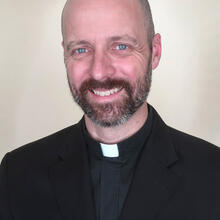“What should I do for Lent?” That’s the wrong question. Rather, it is not the first question we should ask. It is the last one. Let me explain.
At several points in the Spiritual Exercises, St. Ignatius Loyola asks us to “pray for a grace.” We are asking God for something. Before asking God, we need to clarify, “What exactly do I want?” It is not an easy question. It requires reflection, honesty and humility. Fortunately, God wants to help us. During the first week of the 30-day retreat, Ignatius invites us to pray for the grace “to overcome oneself and order one’s life” (No. 21). After this, he proposes several spiritual exercises that will help me to receive this grace. These exercises include fasting, acknowledging my own sins and meditating before Christ on the cross. Notice that he starts with the grace and then moves toward action.
Maybe I am feeling stressed and exhausted. A busy Christmas season led into a busy start of the year, and I have not slowed down. This Lent I am seeking peace.
“What should I do for Lent?” That’s the wrong question. Rather, it is not the first question we should ask. It is the last one. Let me explain.
Or maybe I am falling into laziness and sloth. I am overeating, binge-watching and slacking off on my duties in school or work or family. Maybe I fell into some bad habits during the Covid-19 lockdowns. Now I am seeking a renewed sense of discipline and purpose in the Lord.
Asking for a grace demands that I engage in personal reflection, or an Ignatian examen. I am looking into my heart with God’s help. What is happening? How am I doing? What do I need? It is like going to a doctor’s appointment with the Divine Heart Doctor, Jesus. “What seems to be the trouble here?”
Ignatius even asks us to adjust our external environment to aid our contemplation. While praying about my own sins or the passion of Jesus, “I will deprive myself of all light, by closing the shutters and doors while I am in my room” (No. 79). This instinct is mirrored by the church during Lent. Flowers are not used to decorate the altar so that the worship setting remains spare and stark. Choirs and musicians are to maintain a “noble simplicity” during Lent as they lead the congregation in prayer and song.
What grace am I seeking this Lent? What practices will help me to open my heart to God to receive the grace that I am seeking? The church proposes three classic spiritual practices: prayer, fasting and alms. Within these traditions, we notice specific activities: making the stations of the cross, abstaining from meat, giving to the poor and engaging in tangible service to the church and those in need.
God may want to give me the precise grace that I am asking for. Or perhaps God wants to give me something bigger and bolder than I dared to ask.
I may practice all of these activities. My friend may do them, too. However, we may be seeking different graces. She is seeking renewal and peace after the death of a family member, whereas I am seeking to move past my selfish tendencies. This is part of the beauty and mystery of Lent. We all come before Christ, asking for what we need. He sees us, knows us, loves us and gives us the grace that we need.
After I have asked God for a grace, I can then ask God, “What grace do you want to give me this Lent?” God may want to give me the precise grace that I am asking for. Or perhaps God wants to give me something bigger and bolder than I dared to ask. A new mission or healing or a closer relationship with God? What practices does God want me to take up in order that I may open my heart and my life to receive this grace? Visiting a seminary? Going on a retreat? Increasing my prayer?
Without self-reflecting, we can too quickly decide to just “do something for Lent” before we know which grace we are seeking. Losing weight and watching less Netflix are fine. But why am I doing this?
Try this. If you have a Lenten practice in mind, bring it to prayer. Three times, ask the question, ‘‘Why?’ and answer with “because.”
This Lent, ask yourself: What grace am I seeking? What grace does God want to give me? After meditating on those questions, it will be clear “what I should do for Lent.”
“Jesus, I’m thinking of watching less Netflix this Lent. And here’s why I’m doing that…”
Maybe I acknowledge that I am wasting too much time and avoiding some important relationships. Bring that into prayer again.
“Jesus, this Lent, I want to deepen my relationships with a few key people—including you. I want to do this because…”
One more time: “Jesus, relationships are the most important things in my life, and I’ve been neglecting them. You call me to love God and love my neighbor.”
Notice the spiritual movement. We started with “cutting TV” and ended with “loving God,” with several key steps in between (I’ve been neglecting relationships, and they are important to me). My Lenten practices now have a clearer sense of mission rooted in faith. Connecting the dots, I may want to cut down TV this Lent so that I can have more time for prayer and important relationships. That’s “What I should do for Lent.” We didn’t start there, we ended there.
This Lent, ask yourself: What grace am I seeking? What grace does God want to give me? After meditating on those questions, it will be clear “what I should do for Lent.”







